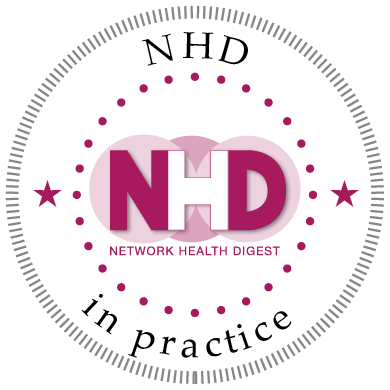Emma writes...
Thoughts, resources and comment from the NHD Editor.
Under pressure! Reducing the risk of hypertension

At the end of September, the World Health Organisation (WHO) published a new global report on hypertension, which found that over one billion people are at risk due to uncontrolled high blood pressure. (1) Approximately 1.4 billion people around the world are living with hypertension, with only one in five having it under control.
In the UK, data collected as part of the WHO report shows that 12.6 million adults aged 30–79 years live with hypertension, an increase from an estimated 11.8 million adults in 2017. (1, 2) Currently, approximately 8.1 million UK adults do not have the condition controlled. (1)
What is hypertension?
Hypertension is the persistent elevation of arterial blood pressure. According to NICE3:
Hypertension should be suspected if clinic systolic blood pressure is sustained above or equal to 140 mmHg, or diastolic blood pressure is sustained above or equal to 90 mmHg, or both.
The diagnosis is then confirmed with ambulatory blood pressure monitoring (ABPM) or home blood pressure monitoring (HBPM).
Hypertension increases the risk of a range of conditions, which include heart failure, coronary artery disease, stroke, chronic kidney disease, peripheral arterial disease, and vascular dementia. (5) Generally, there are no symptoms, but some people with very high blood pressure may experience headaches, blurred vision, chest pain, or dizziness. (4)
Hypertension is a major risk factor for cardiovascular disease (CVD) and related disability, with at least half of all heart attacks and strokes being associated with hypertension. (5) Blood pressure and adverse cardiovascular events have a continuous direct relationship, with higher risks at higher levels of blood pressure. (5) However, correction and management of hypertension can reduce these risks. (5)
Who’s at risk of hypertension?
The latest WHO report shows that 33% of the population aged 30-79 years have hypertension. (4) The risk of developing hypertension increases with older age. There may be genetic factors to consider, and there’s a slightly higher incidence in men when compared with women. (1,4,6) Ethnicity plays a role too, with people of black African and black Caribbean origin being more likely to be diagnosed with hypertension. (6) Social deprivation is a key risk factor. People from the most deprived areas in England are 30% more likely to have hypertension than those from the least deprived. (6) Lifestyle factors such as being overweight or obese, excessive alcohol or dietary salt consumption, unhealthy diet, smoking, lack of physical activity, and stress are associated with hypertension. (4,6)
Preventative measures

Some risk factors can be addressed to lower blood pressure and reduce the risk of hypertension. This can also support those with hypertension to improve their health status, which may need to be in conjunction with medication. (4)
Modifiable lifestyle factors such as diet, exercise, alcohol consumption, and smoking are all targets for reducing the risks associated with hypertension.
The WHO recommends:
Do | Don't | Other factors to consider: |
|---|---|---|
Eat more vegetables and fruits. | Eat too much salty food (aim for > 2 grams per day). | Reduce and manage stress. |
Sit less. | Eat foods high in saturated or trans fats. | Regularly check blood pressure. |
Be more physically active, which can include walking, running, swimming, dancing or activities that build strength, like lifting weights. | Drink too much alcohol (1 drink daily max for women, 2 for men). | Treat high blood pressure. |
Do strength-building exercises two or more days each week. | Smoke or use tobacco. | Manage other medical conditions. |
Lose weight if you’re overweight or obese. | Miss or share hypertension medication. | Reduce exposure to polluted air. |
Ensure hypertension medications are taken as prescribed. |
Making the change
Consuming too much salt, alcohol, or saturated or trans fats have all been flagged as risk factors. Maintaining a healthy weight and being active are other key factors in hypertension health. NICE guidance supports the provision of lifestyle advice and continued support around this. (7) There are many resources available to support healthcare professionals, patients, and carers to make diet and lifestyle changes. Here are a few key options:
The British Dietetic Association (BDA) offers advice via its‘High blood pressure (hypertension) and diet’ fact sheet. (8) The fact sheet outlines fundamental advice for reducing salt and alcohol intake, eating a healthy diet, and making other changes, such as stress management, that can support blood pressure reduction.
Empowering patients to manage their blood pressure is a key part of treatment. The British Heart Foundation (BHF) provides a range of resources to support patients in measuring and managing blood pressure and controlling blood pressure. (9) There are various BHF webpages offering advice on eating well and being active.
The Dietary Approaches to Stop Hypertension (DASH) diet is an approach specifically developed to lower high blood pressure. (10) This plant-based diet prioritises fruit, vegetables, whole grains, nuts, seeds, and legumes, and promotes moderate intakes of low-fat dairy and limits red and processed meat. Essentially, the DASH diet is rich in fibre, has a positive unsaturated to saturated fat ratio, and is low in salt and sugar. It’s also rich in minerals such as potassium, calcium, and magnesium, which are associated with reducing blood pressure. The diet leans into healthy eating and portion control.
Randomised controlled trials have shown that the DASH diet is highly effective at lowering blood pressure and improving blood lipids. (10) There is evidence that has demonstrated a strong inverse association between compliance with the DASH diet and CVD incidence and mortality. (10)
Heart UK offers a wealth of information for healthcare professionals about the DASH diet, with links to various research papers and useful information sources.
For patients, the BHF’s ‘DASH diet: what to eat for high blood pressure’ resource provides a good overview and practical advice in the form of portion sizes and recipe ideas. (11)
END NOTE
Hypertension is a long-term condition for many, which may lead to further chronic conditions and deterioration in health. There are modifiable risk factors that can be tackled via dietary and lifestyle advice. This advice may need to be implemented alongside other treatment options, such as medication. However, diet and lifestyle changes have a positive impact on hypertension risk. Whilst much of the advice isn’t particularly snazzy, it has been shown to be effective when adopted, and the wider benefits of healthy eating and being active are well known to extend beyond the management of hypertension.

Emma has been a Registered Dietitian for over 18 years and has experience in adult and paediatric dietetics. She has been the Editor of NHD for nine years, steering the editorial content and supporting the production process. Emma currently works in industry.
Emma Coates, RD
References
WHO (2025) Global report on hypertension 2025: high stakes: turning evidence into action. Global report on hypertension 2025: high stakes: turning evidence into action
NICE (2025) Hypertension: How common is it? Prevalence | Background information | Hypertension | CKS | NICE
NICE (2025) Hypertension. Hypertension | Health topics A to Z | CKS | NICE
WHO (2025) Hypertension. Hypertension
NICE (2025) Hypertension: What are the complications and prognosis? Complications and prognosis | Background information | Hypertension | CKS | NICE
NICE (2025) Hypertension: What are the risk factors? Risk factors | Background information | Hypertension | CKS | NICE
NICE (2025) Hypertension: Scenario: Management. Scenario: Management | Management | Hypertension | CKS | NICE
BDA (2023) High blood pressure (hypertension) and diet. High blood pressure (hypertension) and diet - BDA
BHF (2025) Manage your blood pressure at home. Manage your blood pressure at home - BHF
Heart UK (2024) The DASH diet. DASH
BHF (2025) DASH diet: what to eat for high blood pressure. DASH diet: what to eat to lower high blood pressure - BHF

